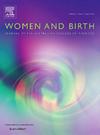Midwives’ opinions and engagement with midwifery research: A cross-sectional study
IF 4.4
2区 医学
Q1 NURSING
引用次数: 0
Abstract
Background
Midwives’ engagement in research is vital for advancing evidence-based practice and enhancing quality care. Despite the expectation that midwives incorporate evidence into their practice, the profession has historically been underrepresented in research.
Aim
To investigate midwives' opinions about midwifery research and assess their level of engagement in midwifery-led research.
Methods
A cross-sectional design and a convenience-based sampling approach at one metropolitan hospital were used. Data were collected using an online survey with a combination of closed, multichoice and open-ended questions. Data were analysed using SPSS for descriptive and univariate statistics. Content analysis was used for free-text responses.
Findings
Sixty midwives participated, with a response rate of 16 % (60/380). Most participants expressed positive attitudes toward research,. Less positive attitudes were obtained for confidence and access to resources. A small proportion reported they had authored or co-authored a peer-reviewed journal article (6.7 %), and presented at a conference (8.3 %) or within their healthcare organisation (18.3 %). Midwives reported significant barriers to engagement in research, particularly related to lack of time, low-confidence, and minimal research education.
Discussion
The findings illustrate the recognition by midwives of the essential role that clinical experience, scientific knowledge, and research play in the practice and advancement of midwifery. However, midwives perceive there are barriers to their involvement in research.
Conclusion
Larger studies are needed to develop, implement and evaluate targeted interventions to promote midwifery-led research. Strategies are needed to increase midwives’ engagement in research, including the provision of adequate time, involvement in research activities, and access to resources.
求助全文
约1分钟内获得全文
求助全文
来源期刊

Women and Birth
NURSING-OBSTETRICS & GYNECOLOGY
CiteScore
7.20
自引率
13.20%
发文量
371
审稿时长
27 days
期刊介绍:
Women and Birth is the official journal of the Australian College of Midwives (ACM). It is a midwifery journal that publishes on all matters that affect women and birth, from pre-conceptual counselling, through pregnancy, birth, and the first six weeks postnatal. All papers accepted will draw from and contribute to the relevant contemporary research, policy and/or theoretical literature. We seek research papers, quality assurances papers (with ethical approval) discussion papers, clinical practice papers, case studies and original literature reviews.
Our women-centred focus is inclusive of the family, fetus and newborn, both well and sick, and covers both healthy and complex pregnancies and births. The journal seeks papers that take a woman-centred focus on maternity services, epidemiology, primary health care, reproductive psycho/physiology, midwifery practice, theory, research, education, management and leadership. We also seek relevant papers on maternal mental health and neonatal well-being, natural and complementary therapies, local, national and international policy, management, politics, economics and societal and cultural issues as they affect childbearing women and their families. Topics may include, where appropriate, neonatal care, child and family health, women’s health, related to pregnancy, birth and the postpartum, including lactation. Interprofessional papers relevant to midwifery are welcome. Articles are double blind peer-reviewed, primarily by experts in the field of the submitted work.
 求助内容:
求助内容: 应助结果提醒方式:
应助结果提醒方式:


